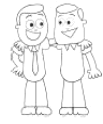Summer Holidays This year is going to be different! Rick, Ann, Tony and Victoria are talking about their holidays this year. | |
| This year I'm not behaving well at home, and I'm not studying hard at school. My parents think I'm lazy. They're worried so they are sending me to a camp in the mountains this summer. I'm going to spend six weeks with some other teenagers like me. We are going to walk ten kilometres every day and I think it's going to be awful. |
| This summer it is going to be interesting because I will spend it with my sister for a month. I'm planning to have a big party for her birthday. Lots of friends and family are coming. We are going to have a special meal that day and then we're going to dance. I'm sure she will like it. |
| This summer I will spend my summer holiday with my grandparents who live in the country. My brother and I are going to stay with them for two months. I can ride a horse every day. I can also go swimming in the lake with my grandfather. I think my holiday will be exciting. |
| My uncle and my aunt are giving me a special holiday this year—two weeks at a football club in London. I'm not going to play football with other club members all day. We're going to visit all the famous places like the Buckingham Palace. We're looking forward to it. I'm sure we'll have an unforgettable time there. |
1.Rick will spend the summer holiday with ________ .
A.other teenagers B.his sister C.his brother D.other club members
2.What will Tony do in the summer holiday?
A.Walk ten kilometres. B.Have a big party. C.Ride a horse. D.Play football.
3.Victoria is going to spend ________ at a football club.
A.a month B.two weeks C.six weeks D.two months






